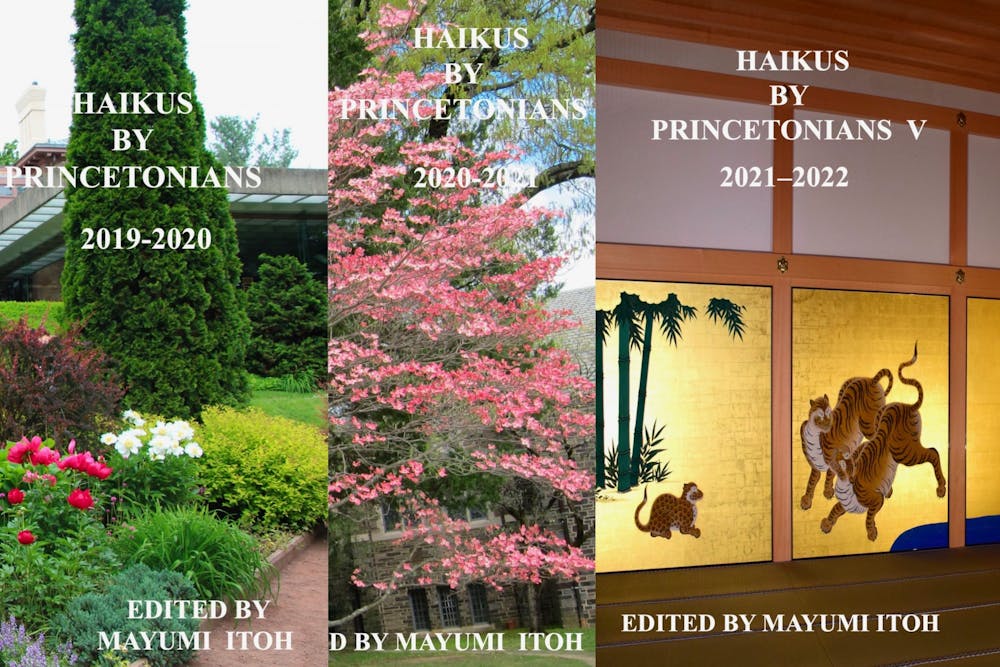For over five years, students have had the opportunity to work with Dr. Mayumi Itoh to write, recite, and discuss their original haikus in weekly haiku workshops. Itoh holds these seminars nearly every Wednesday in the Frist Campus Center from 4:30–6 p.m.
In an interview with The Daily Princetonian, Itoh and Mylz Hahn ’23 discussed the goals of the seminar and addressed its return to in-person meetings in the wake of the COVID-19 pandemic.
Haikus are a style of Japanese poetry characterized by a 5–7–5 syllabic pattern. However, as Itoh noted, the best haikus involve a much more nuanced interpretation of the poem’s meter — one that emphasizes observation. Seasons retain importance to haiku-writing as well: most haikus contain a “season word” that represents the theme of the poem. Thus, she prioritizes teaching her students how to effectively convey their emotions through their surroundings and the seasons.
Itoh began the program after she retired as a political scientist specializing in Sino-Japanese relations. Her familiarity with the language and her love of Japanese literature compelled her to devote her time as a retiree to teaching the art of haiku-writing. Unlike Princeton’s Japanese curriculum, which involves rigorous coursework designed to help students quickly achieve fluency, Itoh’s workshops provide a more informal, slow-paced way for students to practice their skills.
At the end of each academic year, Itoh compiles her students’ work into an anthology entitled “Haikus by Princetonians.” The collection contains 12 chapters of poetry, each of which represents a month. Through this anthology, Itoh ensures that her students’ haikus reference all four seasons and that their observations of the University are reflected.
Hahn, dubbed a “regular” by Itoh, has been part of the workshop for four years and has contributed to several publications. He started learning Japanese as a first-year and said the writing sessions have enabled him to apply what he learned in a more creative setting. He also explained that his understanding of Japanese creative writing, specifically the nuances of poetry that are not typically taught in classes, has greatly aided him on his path to becoming a translator of popular media.
The workshop continued to meet throughout the pandemic, in spite of the inherent challenges. For most of 2020 and 2021, meetings were held remotely, but Itoh noted that her students were undeterred by the change, remaining engaged and excited to write and analyze each other’s work. Itoh thus also organized remote sessions in the summers of 2020 and 2021. Capitalizing on Zoom’s ability to connect people regardless of location, she offered students the opportunity to continue participating in the program while residing off campus. The summer sessions were particularly beneficial for those international students whose time-zone differences rendered them unable to attend meetings during the school year.
Although the pandemic had little impact on the seminar logistically, Itoh noted a drastic change in the content of her students’ haikus. Because the haikus created are dependent on the writer’s surroundings, several students presented poetry that differed dramatically from what was showcased in the in-person sessions. For instance, some reflected on how they experienced seasons differently than they would at Princeton in their writings. Itoh cited a particularly emotional haiku written by a graduate student living in Wuhan, China. The student vividly described the final train leaving the Wuhan station before lockdown, equating the sensation to the coming of winter:
“冬の朝
出入禁止の
武漢駅“
Or, in translation:

“A winter morning
Wuhan Railway Station
is about to shut down”
Through their writing, the student was able to cope with the pandemic while maintaining their connection to the University, their classmates, and Japanese culture.
Plans to hold the haiku writing seminar in the following years are already in place, and Hahn, who was pivotal in preserving the program during the pandemic, said he hopes the seminar will continue to flourish with the return to on-campus sessions. “The Haiku workshop has been a highlight of my time at Princeton,” he said. “It’s been a constant during a time of a lot of different struggles I’ve had over the years. I’m very grateful for that, and I hope more people get to experience it.”
Itoh’s workshops are not restricted to students studying Japanese. Anyone interested can participate and contribute to celebrating Japanese literature and culture on campus. Participants can also have their work published in Itoh’s yearly anthology, which provides an opportunity for students to present their poetry to a broader audience. This year’s anthology, “Haikus by Princetonians 2022–2023,” will be compiled at the end of the academic year.
Arec Keomurjian is a contributing writer for the Prospect at the ‘Prince.’ He can be reached at ak1498@princeton.edu or on Instagram at @areck312.








